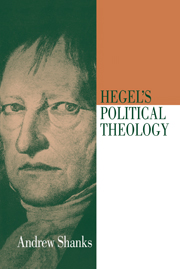2 - Philosophy and dogmatics
Published online by Cambridge University Press: 02 February 2010
Summary
A PROTESTANT AQUINAS?
And so – one might ask – ‘Why did Hegel not become for the Protestant world something similar to what Thomas Aquinas was for Roman Catholicism? How could it come to pass that, very soon after Hegel's death and even more plainly from the middle of the century onwards, it was exactly his achievement which began to be looked upon, with a pitying smile, as representing something which was in the main already superseded?’
Posed in this way, however – as it is by Karl Barth – the question is, I think, a very misleading one. (If, that is to say, it is taken as implying a judgement on Hegel's own actual intentions – as Barth's subsequent argument tends to confirm.) The suggestion that Hegel is to be regarded as some sort of would-be latter-day Thomas Aquinas seems to me to very dubious. The whole orientation of his thought was in an important sense, surely, quite different.
Coming from Barth, of course, the compliment which the question implies is double-edged in the extreme. Certainly, Barth wants to emphasize Hegel's stature. He even expresses himself in the most hyperbolic terms: ‘Was not Hegel he who should come as the fulfiller of every promise, and was it worth waiting for another after he had come?’ In general, he presents the history of nineteenth-century theology as a story of decline, a decline of which the increasing marginalization of Hegel is directly symptomatic.
- Type
- Chapter
- Information
- Hegel's Political Theology , pp. 71 - 102Publisher: Cambridge University PressPrint publication year: 1991
- 1
- Cited by

